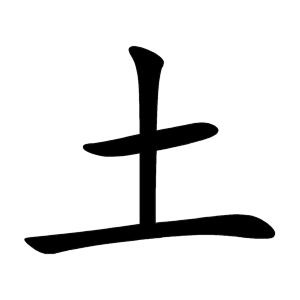土
- earth;
- soil;
Etymology
It is a pictograph modeled after a heap of soil on the ground.
For reference, the character representing a sprout growing from the ground is 生 (to grow, to be born).
Historically, 土 is one of the Five Elements (오행) and has been considered very important.
It is mutually generating (상생) with 火 (fire) and 金 (metal), but conflicting (상극) with 木 (wood) and 水 (water).
Similar shape characters
Characters with 土
6 strokes
8 strokes
9 strokes
11 strokes
12 strokes
18 strokes
20 strokes
土
흙
토
heuk
to
Kangxi radical:32
Strokes:3
Unicode:U+2F1F
Cangjie input:
- 土 (G)
Composition:
- ⿱ 十 一
